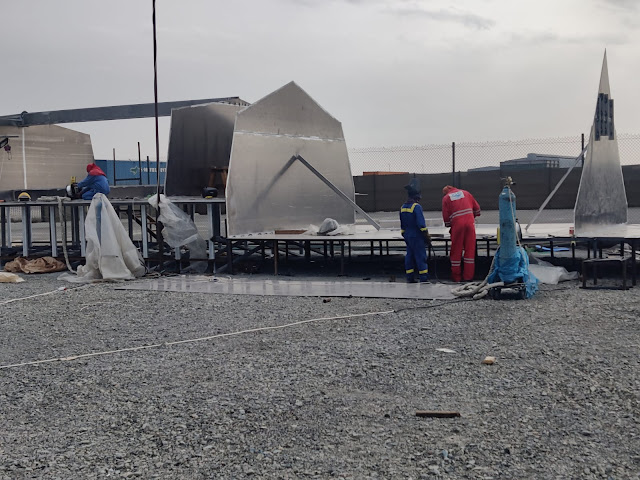How Aluminum Tug Builders Are Meeting Modern Maritime Challenges
Aluminum tug builders are taking a central role in revolutionizing the shipping industry. As port operations become increasingly complex and environmental regulations tighten, there has never been a greater need for more intelligent, quicker, and cleaner tugboats.
Aluminium tug manufacturers are heeding the call by designing ships lighter, more efficient, and designed to be versatile. From lowering emissions to reducing fuel consumption, they're taking tugboats into a whole new era in the 21st century.
The world at sea is evolving rapidly. Ports are more congested. The cost of fuel continues to increase. Rules are becoming stricter. Tugboats, which were once straightforward workhorses, are now at the center of contemporary port infrastructure. To counteract this, operators such as VU Marine are coming forward with cutting-edge designs that last.
1. Reduced-weight hulls reduce fuel expenses
Another of the primary benefits of aluminum is weight. Aluminum weighs a lot less than steel, meaning a tugboat requires less power to travel. That directly reduces fuel usage—sometimes by as much as 30%. Reduced weight also enhances maneuverability, particularly in tight port operations.
Long-term, this equates to significant savings and facilitates meeting emissions standards without performance compromise.
2. Ideal Match for Hybrid and Electric Power
Most ports are now moving towards zero-emission harbour vessels. Aluminum tugs are the perfect choice to make this transition due to their light body. Hybrid and battery-powered setups function more efficiently when the ship does not need massive engines just to begin propulsion.
This is why more and more tugs building company in UAE and elsewhere are concentrating on electric-ready aluminum designs. Aluminum provides the ideal combination of strength and weight to match today's drives.
3. Strong, Rust-Resistant, and Durable
Although aluminum is light in weight, it's strong. It takes a blow well and withstands rust far better than steel, so it's a durable option—particularly in saltwater conditions. That translates into fewer repairs, less down time, and a reduced overall cost of ownership.
Maintenance requirements are lower, too. Aluminum hulls don't need the same degree of repainting, sandblasting, or anti-rust treatment that steel ships need.
4. High Maneuverability for Busy Harbors
Maneuverability is essential for tugboats that have to navigate narrow or congested waters. Aluminum is lighter, so fast-turning, quick-stopping craft can be easily designed. These vessels react more smoothly to controls and accomplish intricate maneuvers more effectively than heavy steel counterparts.
That's why more operators are turning to designs provided by an advanced tugs building company that recognizes the needs of busy ports and industrial areas.
5. Built-In Safety and Versatility
Aluminum tugs often include safety features like foam-filled compartments, which improve buoyancy and make the vessel harder to sink. This is especially useful in rescue scenarios or harsh weather conditions.
Aluminum is also easier to repair in the field. Whether it’s a minor dent or a cracked plate, the fix is often faster and cheaper than with steel—keeping vessels in operation longer.
6. Lower Operating Costs Over the Vessel’s Life
Although aluminum tugs can be more expensive to construct in the first place, they are considerably less expensive to operate and maintain in the long run. Operators save on fuel, maintenance, paint, corrosion protection, and downtime. Decades later, these savings add up big time.
That makes aluminum a savvy investment—not only for the planet, but for the bottom line too.
7. Simpler Upgrades and Modular Additions
Since aluminum is simpler to alter than steel, these tugs can be constructed with modular units or future-proof systems. Whether it's integrating new navigation equipment, refitting propulsion systems, or fitting digital sensors, aluminum vessels are simpler to modify over time.
That makes an enormous difference in the rapidly evolving marine technology of today.
8. Environmentally Friendly and Fully Recyclable
Aluminum is 100% recyclable, which reduces environmental impact at the end of the vessel’s service life. Combined with fuel savings and compatibility with electric power, aluminum tugs are one of the most sustainable vessel types on the water today.
As regulations become stricter worldwide, aluminum gives tug owners a head start on compliance.
9. Smart Tech, Remote Ops, and Digital Readiness
New tugboats aren't merely more powerful—they're intelligent. Contemporary aluminum tugs feature real-time systems for monitoring fuel consumption, engine efficiency, and location. Numerous ones also have remote diagnostic capability and can be integrated into autonomous or semi-autonomous systems.
A progressive tug builder in UAE such as VU Marine is already considering such features to empower port operators.
10. VU Marine's Role in Shaping the Future
VU Marine is one of the builders who fully grasp the potential of aluminum as a construction material for tugs. They merge strength, speed, and safety with cutting-edge tech and forward-thinking vision.
Their expertise in building tugs for ports, offshore support, and rescue operations makes them precision players with a delivery of innovation on every vessel. They are totally focused on quality, safety, and sustainability, placing them at the forefront of the modern maritime revolution.
Final Thoughts
Contemporary maritime challenges require intelligent solutions. Aluminum tugboats provide exactly that: reduced weight, improved performance, and reduced costs—all without compromising fleets for the hybrid, digital, and environmentally friendly future.
With industry leaders like VU Marine pushing boundaries, aluminum tugs are no longer a substitute. They're the intelligent choice for any serious shipowner, port operator, or industrial fleet wanting to keep up with today's requirements—and tomorrow's expectations.




Comments
Post a Comment